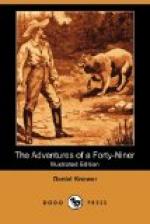with the heat of the tropics and fatigued I threw
myself in the water. Lieutenant M. exclaimed:
“Do not give up in that way.” “I
am not giving up,” I replied; “only refreshing
myself.” In a short time he did the same
thing. As we lay there we thought we heard voices.
In looking back who should we see but one of our countrymen,
the most gladdening sight to us. We felt saved
at once. We asked him if he had any provision.
He said he thought not. Then he said one of his
companions might have a little piece of ham left and
some crackers. He said there were three of them,
and they would soon be there, and when they came one
of them had some bacon and a few crackers, which he
gave to us. The eating of it soon refreshed us.
As I had some of the brandy left in the bottle, I
extended it to them, which they were very glad to
receive. Explanations ensued. We, by chance,
had struck the Crusos road, and were but ten miles
from Panama. They had come from Philadelphia
in a brig, and had started across from Crusos, the
head of boating on the Chagres river, and had been
from two to three weeks getting so far across the
Isthmus, and were perfectly astonished at the rapidity
with which we had come. So we joined them and
arrived in Panama that evening. Lieutenant M.
and myself were the first of the one thousand passengers
of the Georgia to enter the city. The office
of the agents of the Pacific steamers was closed.
I went, the first thing in the morning, to purchase
the five tickets for our party. Alas for human
expectation! I was informed it would be several
weeks before the steamer would sail. She had
not yet returned from the first trip to San Francisco.
They said there were but sixty tickets for sale, and
they would not be offered until a few days before
the departure of the steamer. Of course, all
we could do was to abide our chances of getting them.
The city was walled around and dyked like those of
the Middle Ages. Toward the bay the wall was
one hundred feet high by twenty broad. The city
had been on the decline for most a hundred years.
We could see the ruins of what it once had been.
At one time Spain owned all South America, Mexico,
California, Louisiana and Florida. Panama was
the only port of entry on the Pacific coast, and controlled
its commerce. As you enter the gates of the walled
city there is a chapel just inside, where the lights
are always burning on its altars. The first thing
on entering all good Catholics enter, kneel and make
their devotions, seeking the protection of the patron
saint of the city. The head alcalder of the city
was a Castilian Spaniard, a venerable-looking gentleman,
white as any Northern man, evidently of Scandinavian
descent, who ages back conquered Spain and divided
the land up among themselves and became its nobility,
from whom the present rulers of Spain are descendants.
It is said that when conquered, the original inhabitants
of Spain, to a great extent, fled to their vessels,
put to sea, and found the island of Ireland, from
which the present inhabitants are descendants.
The second alcalder was a negro as black as I have
ever seen.




